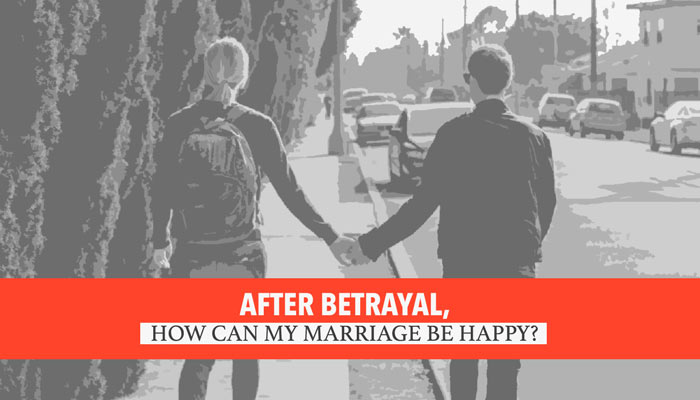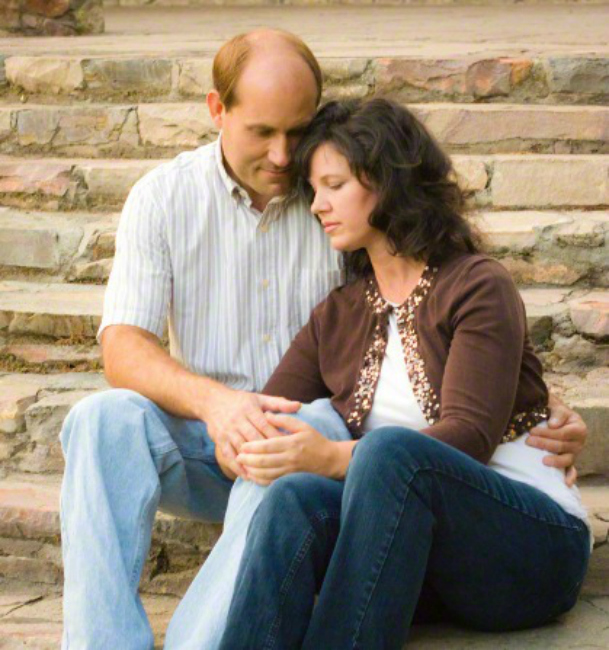
By Jonathan Decker, Licensed Marriage and Family Therapist
This column is not meant to replace personal revelation, priesthood guidance, or intensive counseling. It is one licensed therapist’s attempt to help by merging sound doctrine with sound science.
Q: How do you have a healthy, happy marriage with a spouse you can’t ever fully trust because of addiction and betrayal trauma? [The addiction and betrayal were both sexual in nature].
A: Thank you so much for reaching out. This is an increasingly common issue as pornography use, infidelity, and dishonesty show up in the Church’s marriages, along with other forms of addiction. My sincerest sympathies for the heartache and pain this has caused you and yours.
If you’ll allow, I’d like to start by gently challenging your question. You asked how to have a healthy, happy marriage with a spouse whom you can’t ever fully trust. However, there’s no such thing as a healthy, happy marriage without trust. Trust is necessary for the marriage to be strong and joyous. For your marriage to survive and thrive, trust must be restored.
Sister Barbara B. Smith taught: “Trust is to human relationships what faith is to Gospel living. It is the beginning place, the foundation upon which more can be built. Where trust is, love can flourish” (“A Safe Place for Marriages and Families,” October 1981 General Conference).
The question is why can’t you trust your spouse at this point? I see only two reasons. One, your spouse is not actively repenting and therefore is not earning your trust. Two, your spouse has repented, is now accountable, transparent, remorseful, and has abandoned the sin, but your pain is preventing you from trusting again.
Let’s address each of these.

1) If your spouse is not actively repenting. Keep in mind that you are not obligated to stay with a spouse who repeatedly breaks his or her marriage covenants. I’m not saying you should rush to divorce. My bias is always to try and save the marriage. I am saying that you shouldn’t stay in a marriage if it becomes apparent that things will not change.
President James E. Faust expressed: “In my opinion, ‘just cause’ [for divorce] should be nothing less serious than a prolonged and apparently irredeemable relationship which is destructive of a person’s dignity as a human being” (“Father, Come Home” April 1993 General Conference). This would certainly apply to a marriage in which one spouse engages in an affair or pornography use without repentance.
The Lord Jesus Christ may as well have been speaking of modern pornography when he taught “Thou shalt love thy wife with all thy heart, and shall cleave unto her and none else. And he that looketh upon a woman to lust after her shall deny the faith, and shall not have the Spirit, and if he repents not he shall be cast out” (Doctrine and Covenants 42:22-23).
If your spouse is not vigorously, purposefully engaged in the repentance process for viewing pornography, you don’t have to put up with it. My advice: if they act like “it’s no big deal,” don’t see anything wrong with it, and have no intention of stopping, let them know they’re in danger of you “casting them out.” If they recognize it as contrary to the Gospel and are actively, humbly, transparently fighting it, that’s another story.
Christ continued by addressing the sin of adultery, which is along the same spectrum: “Thou shalt not commit adultery; and he that committeth adultery, and repenteth not, shall be cast out. But he that has committed adultery and repents with all his heart, and forsaketh it, and doeth it no more, thou shalt forgive. But if he doeth it again, he shall not be forgiven, but shall be cast out” (Doctrine and Covenants 42:24-26).
In my field, Drs. John and Julie Gottman have offered research-based evidence for the harm pornography does to relationships. They’re also experts in treating infidelity. I recently attended a three-day training they held entitled “Treating Affairs and Trauma: Helping Couples Heal and Rebuild Trust.” During the training, Dr. Gottman said to therapists treating infidelity: “Make sure the affair is really over or you don’t do therapy. You can’t work on the marriage if the person is still involved with the affair partner. It is incompatible with saving the marriage.”
If your spouse is having an affair, they need to stop immediately or your marriage is over. You need to have the strength to end it if they won’t. If they had an affair but have ended it, extensive counseling is necessary. Your spouse will have to own the behavior completely. He or she must be fully accountable. They’ll need to sit with their guilt and hear your hurt, your anger, and your heartbreak without minimizing, justifying, or blaming you.
They’ll also need to make every arrangement to prevent an affair from happening again, including an action plan for overcoming past weakness, drawing healthy boundaries, and keeping you in the loop. Let them know that if they cannot do this, the marriage cannot survive, because there is no marriage without trust, and there is no trust without honest accountability.
If your spouse struggles with pornography use, recognize that the problem has nothing to do with your attractiveness, sexual availability, or worth as a spouse or person. It has everything to do with a temptation that is common and from which God provides a way to escape (see 1 Corinthians 10:13). Lustful thoughts and actions are, for many, a natural tendency that must be overcome to live happier and closer to God (see Mosiah 3:19). Coming to bridle passions such as these is necessary to be full of love (see Alma 38:12) which will allow for a healthy, happy marriage.
I’m not suggesting that you’ve been perfect in your marriage or that you’ve not had a hand in any marital strain, loneliness, or stress. What I am saying is your spouse is accountable for their own choices; they cannot justify their behavior by shifting the blame to you. If he or she is working on overcoming pornography, has enlisted priesthood help, and is honest and transparent with you (without blaming you), you can be a great support to them in their battle. Don’t give up on them. Pray for (and with) them. If they, in turn, have a broken heart and a contrite spirit (see 3 Nephi 9:20), it can help in your healing.
 2) If your spouse has repented (or is repenting) but you cannot bring yourself to trust and forgive. It is important to remember that while Jesus commanded us to forgive (see Matthew 6:14-15), He never commanded us to trust. Forgiveness and trust are not the same things. Forgiveness should be freely given. Trust, however, must be earned.
2) If your spouse has repented (or is repenting) but you cannot bring yourself to trust and forgive. It is important to remember that while Jesus commanded us to forgive (see Matthew 6:14-15), He never commanded us to trust. Forgiveness and trust are not the same things. Forgiveness should be freely given. Trust, however, must be earned.
Forgive your spouse. Let go of bitterness, anger, and hurt. Desire what is best for them. Treat them with kindness and respect. But do not trust unless they have proven themselves trustworthy. You can forgive whether or not your marriage survives. But if you are to remain together, trust must be restored.
If your spouse has repented, then you have a choice to make. They can be completely trustworthy at this point, but it won’t matter if you don’t choose to trust them. You have to work through your betrayal trauma, your anger, and your pain. It’s a process. A skilled therapist can help. So can priesthood leadership and your own personal relationship with God.
At a certain point, if your spouse has repented, it’s going to come down to you choosing to forgive and trust or not. That can be scary. It will require you to be vulnerable. There is no 100% guarantee that you won’t be hurt. But if your marriage is to survive, you’ll need to take that leap of faith.
This act of forgiving and choosing to trust is an opportunity for you to grow more Christlike. After all, it was He who said “he who has repented of his sins, the same is forgiven, and I, the Lord, remember them no more. By this ye may know if a man repenteth of his sins- behold, he will confess them and forsake them” (Doctrine and Covenants 58:42-43). Forgiving and trusting penitent sinners is a godly attribute.
The Lord’s Atonement can take this awful situation and turn it into something good. He can take the most bitter of lemons and turn them into the sweetest lemonade. Remember, however, that He is not asking you to endure a cycle of abuse and adultery. As I quoted earlier “he that has committed adultery and repents with all his heart, and forsaketh it, and doeth it no more, thou shalt forgive. But if he doeth it again, he shall not be forgiven, but shall be cast out” (Doctrine and Covenants 42:24-26).
WHERE TO GO FROM HERE
 President James E. Faust taught, “Nothing devastates the core of mutual trust necessary to maintain a fulfilling relationship like infidelity. There is never a justification for adultery. Despite this destructive experience, occasionally marriages are saved and families preserved. To do so requires the aggrieved party to be capable of giving unreserved love great enough to forgive and forget. It requires the errant party to want desperately to repent and actually forsake evil” (“The Enriching of Marriage,” October 1977 General Conference).
President James E. Faust taught, “Nothing devastates the core of mutual trust necessary to maintain a fulfilling relationship like infidelity. There is never a justification for adultery. Despite this destructive experience, occasionally marriages are saved and families preserved. To do so requires the aggrieved party to be capable of giving unreserved love great enough to forgive and forget. It requires the errant party to want desperately to repent and actually forsake evil” (“The Enriching of Marriage,” October 1977 General Conference).
In all of this, seek the guidance of the Lord through scripture study, prayer, and temple attendance. Prayerfully consider counsel from local priesthood leadership while always following personal revelation. Seek professional help from a counselor who shares your values. That’s not a personal plug; while I’m happy to help, it doesn’t have to be me.
It may be right for you to stay married. It may not be. Your marriage can heal from addiction. It can survive betrayal trauma. Whether it does will depend on the humility, faith, forgiveness, and honesty you both bring to the table. It will require both of you working with the Lord.
Have anything to add to the discussion? Sound off below! If you found this article to be helpful, please share!
To ask Jonathan a question anonymously click here. Note in your message whether or not you’d like to be featured in the “Ask a Mormon Therapist” column. No private details will be included. To ask him a question publicly, or to follow his Gospel-centered posts, join his Facebook group. You can meet Jonathan at this year’s BYU Education Week, where he’ll be presenting on “Stepfamilies and Adoptive Families in the Gospel” from August 22 to August 25. Jonathan is a licensed marriage and family therapist and CEO of Your Family Expert.





